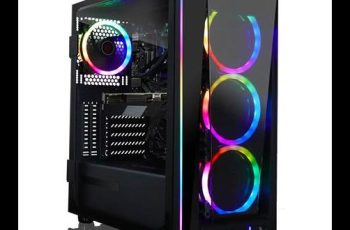When it comes to building a gaming PC, the choice between AMD and Intel processors can be a tough decision. Both brands offer powerful CPUs that can enhance your gaming experience. In this article, I will delve into the performance, price differences, overclocking potential, future upgradability, and brand loyalty of AMD and Intel processors to help you make an informed choice for your gaming rig.
Performance Comparison
Gaming Benchmarks
AMD and Intel processors are constantly competing to provide the best performance for gaming. Benchmarks show that AMD’s Ryzen processors are excelling in multitasking and heavily-threaded applications, making them a great choice for gamers who also do content creation or streaming.
Multitasking Capabilities
Intel processors, on the other hand, are known for their strong single-core performance, making them ideal for gaming where single-threaded performance is crucial. For gamers who prioritize high frame rates and smooth gameplay, Intel CPUs are often the preferred choice.
Price Differences
Cost of CPU
AMD processors generally offer more cores and threads at a lower price point compared to Intel CPUs. This makes AMD a cost-effective option for gamers looking to build a powerful gaming PC without breaking the bank.
Cost of Compatible Components
It’s important to consider not only the cost of the CPU itself but also the cost of compatible components such as motherboards and coolers. AMD motherboards tend to be more budget-friendly compared to their Intel counterparts, adding to the overall cost savings of choosing an AMD CPU.
Overclocking Potential
Stability
Both AMD and Intel processors can be overclocked to boost performance, but stability is key when pushing your CPU to its limits. Intel CPUs are known for their stable overclocking capabilities, making them a popular choice among overclocking enthusiasts.
Thermal Management
AMD processors typically run hotter than Intel CPUs, which means that effective thermal management is crucial for maintaining optimal performance. Investing in a high-quality CPU cooler is essential for both AMD and Intel systems, but particularly important for AMD builds.
Future Upgradability
Socket Compatibility
AMD has a history of better socket compatibility, allowing users to upgrade their CPUs without changing the motherboard for several generations. Intel, on the other hand, often requires a motherboard upgrade when switching to a new CPU generation.
Chipset Support
AMD chipsets are generally more feature-rich compared to Intel chipsets, offering better support for technologies such as PCIe 4.0 and USB 3.0. This can be a deciding factor for gamers looking to future-proof their systems.
Brand Loyalty
Customer Support
AMD and Intel both provide solid customer support, but Intel is often praised for its responsive customer service and warranty policies. If customer support is a priority for you, Intel may be the way to go.
Product Reliability
When it comes to product reliability, both AMD and Intel have proven track records of delivering high-quality processors. Ultimately, choosing between the two brands may come down to personal preference and brand loyalty.
Conclusion
In conclusion, the choice between AMD and Intel for a gaming PC ultimately depends on your specific needs and preferences. While AMD offers excellent performance at a lower price point, Intel provides top-notch single-core performance and robust overclocking capabilities. Consider factors such as multitasking requirements, future upgradability, thermal management, and brand loyalty when making your decision.
FAQs
1. Which brand is better for gaming, AMD or Intel?
Both AMD and Intel offer excellent gaming performance, but the choice depends on your specific gaming needs and budget.
2. Are AMD processors more cost-effective than Intel CPUs?
AMD processors generally offer more cores and threads at a lower price point compared to Intel CPUs, making them a cost-effective option for gamers.
3. Do Intel CPUs perform better in single-core applications?
Yes, Intel CPUs are known for their strong single-core performance, making them ideal for applications where single-threaded performance is critical.
4. Can AMD CPUs be overclocked for improved performance?
Yes, AMD CPUs can be overclocked to boost performance, but effective thermal management is crucial due to their higher operating temperatures.
5. Which brand has better future upgradability, AMD or Intel?
AMD generally offers better socket compatibility, allowing for easier CPU upgrades without changing the motherboard, compared to Intel’s more frequent need for motherboard upgrades.

